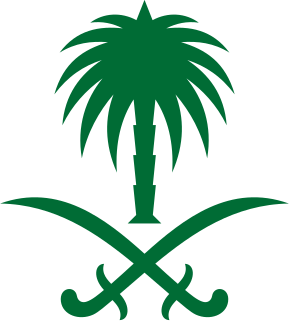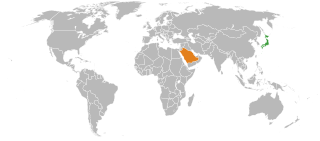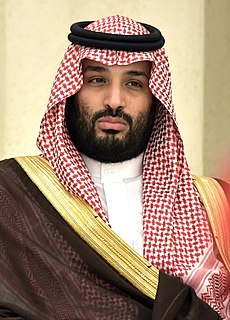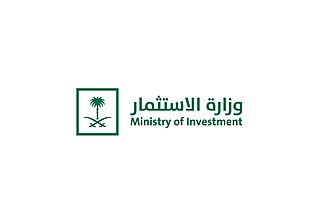Related Research Articles

The politics of Saudi Arabia takes place in the context of a unitary absolute monarchy along Islamic lines, where the King is both the head of state and government. Decisions are, to a large extent, made on the basis of consultation among the King, the Council of Ministers, and the country's traditional elites. Most critics regard the Saudi government as a totalitarian state.

The economy of Saudi Arabia is the largest in the Arab States and the eighteenth largest in the world. A permanent and founding member of the OPEC, Saudi Arabia is also a member of the G20 forum as one of the world's largest economies.

The economy of the United Arab Emirates is the 5th largest in the Middle East, with a gross domestic product (GDP) of US$501 billion in 2022.

Saudi Arabia, officially the Kingdom of Saudi Arabia (KSA), is a country on the Arabian Peninsula in Western Asia. It has a land area of about 2,150,000 km2 (830,000 sq mi), making it the fifth-largest country in Asia, the second-largest in the Arab world, and the largest in Western Asia. It is bordered by the Red Sea to the west; Jordan, Iraq, and Kuwait to the north; the Persian Gulf, Qatar and the United Arab Emirates to the east; Oman to the southeast; and Yemen to the south. Bahrain is an island country off the east coast. The Gulf of Aqaba in the northwest separates Saudi Arabia from Egypt. Saudi Arabia is the only country with a coastline along both the Red Sea and the Persian Gulf, and most of its terrain consists of arid desert, lowland, steppe, and mountains. Its capital and largest city is Riyadh. The country is home to Mecca and Medina, the two holiest cities in Islam.

Salman bin Abdulaziz Al Saud is King of Saudi Arabia, reigning since 2015, and served as Prime Minister of Saudi Arabia from 2015 to 2022. The 25th son of King Abdulaziz, the founder of Saudi Arabia, he assumed the throne on 23 January 2015. Prior to his accession, he was Crown Prince of Saudi Arabia from 16 June 2012 to 23 January 2015. Salman is the 4th oldest living head of state and the oldest living monarch.

The Arab states of the Persian Gulf refers to a group of Arab states which border the Persian Gulf. There are seven member states of the Arab League in the region: Bahrain, Kuwait, Iraq, Oman, Qatar, Saudi Arabia and the United Arab Emirates.

The economy of the Middle East is very diverse, with national economies ranging from hydrocarbon-exporting rentiers to centralized socialist economies and free-market economies. The region is best known for oil production and export, which significantly impacts the entire region through the wealth it generates and through labor utilization. In recent years, many of the countries in the region have undertaken efforts to diversify their economies.

Japan–Saudi Arabia relations are the foreign relations between Saudi Arabia and Japan. Official relations between the two nations were established in 1955.

The Saudi Council of Ministers is the cabinet of the Kingdom of Saudi Arabia. It is led by the King. The council consists of the king, the Crown Prince, and cabinet ministers. The Crown Prince is also Prime Minister and Chair of the Council of Ministers. Since 2015, there are 23 ministers with portfolio and seven ministers of state, two of whom have special responsibilities. All members of the council are appointed by royal decree.
Australians in Saudi Arabia are a sizeable community consisting mainly of expatriates. Their population is estimated to be anywhere up to 5,000 with the majority based in major commercial centres such as Riyadh and Jeddah. Most Australian citizens in Saudi Arabia tend to be occupational-oriented and are employed mainly in the health, education, construction and technology sectors. There are approximately 1,000 Australians who live in Jeddah alone, a city which serves as the country's main port and economic hub. In addition, thousands of Australian Muslims travel and stay in Saudi Arabia each year, often intending to visit the two holiest cities of Islam, Mecca and Medina. Many expatriates in Saudi Arabia are attracted to what they refer to as "the good life", including large salaries and tax-free jobs, consistent weather and a comfortable social life within their housing compounds.
The King Abdullah Petroleum Studies and Research Center (KAPSARC) is an advisory think tank within global energy economics and sustainability providing services to entities and authorities in the Saudi energy sector. located in Riyadh, Saudi Arabia. Founded on July 10, 2007, by the Saudi Council of Ministers, the center brings together an international group of expert researchers of more than 15 nationalities, with a mandate to advance the understanding of domestic and global energy challenges and opportunities, through objective research that informs quality decision-making to enhance global economic outlook.

Adel Fakeih is a Saudi Arabian engineer and the former mayor of Jeddah. He was the minister of labor from August 2010 to April 2015, minister of health between April 2014 and December 2014, and minister of economy and planning between 2015 and 2017. He has been in detention since November 2017.

Mohammed bin Salman Al Saud, colloquially known by his initials MBS or MbS, is Crown Prince and Prime Minister of Saudi Arabia. He also serves as the chairman of the Council of Economic and Development Affairs and chairman of the Council of Political and Security Affairs. He is considered the de facto ruler of Saudi Arabia, being deemed as such even before his appointment as prime minister. He served as minister of defense from 2015 to 2022. He is the seventh son of King Salman.

The modern history of Saudi Arabia begins with the unification of Saudi Arabia in a single kingdom in 1932. This period of time in Saudi Arabia's history includes the discovery of oil in Saudi Arabia and many invents. It goes on to ecnompass Saudi Arabia's brief involvement in World War II in 1945. Afterwards, it includes Saudi Arabia's involvement in the Western Bloc and the Cold War. It also includes Saudi Arabia's proxy conflict with Iran, the Arab Spring, and the ongoing Arab Winter.

The Ministry of Energy is a government ministry in Saudi Arabia and part of the cabinet. It is responsible for developing and implementing policies concerning petroleum and related products. The Ministry of Energy is working to diversify the national energy mix used in electricity production, increasing the share of natural gas and renewable energy sources to approximately 50% by 2030 while reducing the use of liquid fuel.
The Saudi Council of Economic and Development Affairs is one of two subcabinets of the Kingdom of Saudi Arabia. It was established by King Salman to replace the Supreme Economic Council, and is led by the King Salman’s son and Crown Prince Mohammad bin Salman, who holds additional roles such as Defense minister.

Saudi Vision 2030 is a strategic framework to reduce Saudi Arabia's dependence on oil, diversify its economy, and develop public service sectors such as health, education, infrastructure, recreation, and tourism. Key goals include reinforcing economic and investment activities, increasing non-oil international trade, and promoting a softer and more secular image of the Kingdom. It also consists of increasing government spending on the military, as well as manufacturing equipment and ammunition.
National Development Fund The National Development Fund was established by Royal Order No. dated 03/10/2017. It was mandated to advance the performance of development funds and banks in the Kingdom as well as to empower development funds and banks to better fulfil development priorities and economic obligations related to the Kingdom’s Vision 2030.

The Ministry of Investment (MISA), till 2020 as the Saudi Arabian General Investment Authority (SAGIA), is a government ministry in Saudi Arabia that oversees foreign investment in the country besides issuing licenses to foreign investors. It was established as the General Investment Authority in 2000 during the reign of King Fahd and was transformed into a ministry in 2020 through a royal decree issued by King Salman. Khalid al-Falih, the former chairman of Saudi Aramco was appointed as the new minister by replacing governor Ibrahim al-Omar following the ministry's renaming.
References
- ↑ Brinded, Lianna. "Saudi Arabia is learning that preparing for life after oil is easier said than done". Quartz. Retrieved 2019-03-05.
- ↑ Philippa Wilkinson (7 January 2017). "Saudi Arabia's Prince has put his political weight behind reforming the country's economy, but can he pull it off?" . Independent.co.uk. Archived from the original on 2022-06-18. Retrieved 4 June 2018.
- ↑ "Profile – Saudi Crown Prince Mohammed bin Salman". Samaa.tv. 24 June 2017. Retrieved 4 June 2018.
- ↑ "Saudi Arabia answers questions on its transformation: the full statement". Thenational.ae. 7 March 2017. Retrieved 4 June 2018.
- ↑ "National Transformation Program 2020 to spur growth". Arabnews.com. 8 June 2016. Retrieved 4 June 2018.
- ↑ Rima Bhatia (2016). "Assessment of the National Transformation Program (NTP)" (PDF). Gib.com. Retrieved 4 June 2018.
- ↑ Simeon Kerr (22 November 2016). "Honeymoon is over for new Saudi leader as reform pain kicks in". Ft.com. Retrieved 4 June 2018.
- 1 2 "Transforming Saudi Arabia: National Transformation Program 2020 Approved" (PDF). Shearman.com. 14 June 2016. Retrieved 4 June 2018.
- ↑ "Saudi Arabia National Transformation Plan approved: A quick guide". Thenational.ae. June 2016. Retrieved 4 June 2018.
